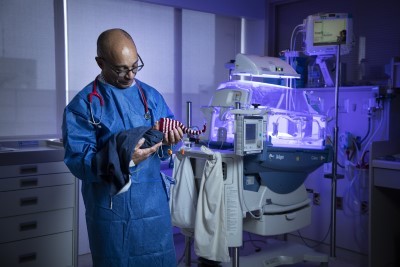 “Understanding the mechanisms of how this chronic lung disease can damage the brain could help lead to preventative therapies.” -Dr. Bernard ThébaudDr. Bernard Thébaud and his team have uncovered clues as to why premature babies with the chronic lung disease bronchopulmonary dysplasia (BPD) may have problems thinking, learning and remembering.
“Understanding the mechanisms of how this chronic lung disease can damage the brain could help lead to preventative therapies.” -Dr. Bernard ThébaudDr. Bernard Thébaud and his team have uncovered clues as to why premature babies with the chronic lung disease bronchopulmonary dysplasia (BPD) may have problems thinking, learning and remembering.
The extra oxygen and mechanical intervention these babies need to breathe damages their lungs, but little was known about how it affects the brain.
Former team member Dr. Marissa Lithopoulos led a study in The Journal of Clinical Investigation that found the extra oxygen damaged the structure and function of the brain’s blood vessels in mouse models of BPD. It also made it more difficult for brain stem cells to renew and become new neurons. These life-long impairments led to motor and cognitive declines in the mice similar to what’s seen in some patients with BPD.
The researchers also found that a variety of genes functioned differently in these mice, including genes involved in cell growth and division, blood vessel growth, blood flow, and neuron development and communication. This knowledge could be used to develop new therapies for babies with BPD, such as the nano therapy for micro-preemies Dr. Thébaud’s team is working on.
“Understanding the mechanisms of how this chronic lung disease can damage the brain could help lead to preventative therapies.” -Dr. Bernard Thébaud, neonatologist and senior scientist at The Ottawa Hospital and CHEO and professor at the University of Ottawa.
Authors: Marissa A. Lithopoulos, Xavier Toussay, Shumei Zhong, Liqun Xu, Shamimunisa B. Mustafa, Julie Ouellette, Moises Freitas-Andrade, Cesar H. Comin, Hayam A. Bassam, Adam N. Baker, Yiren Sun, Michael Wakem, Alvaro G. Moreira, Cynthia L. Blanco, Arul Vadivel, Catherine Tsilfidis, Steven R. Seidner, Ruth S. Slack, Diane C. Lagace, Jing Wang, Baptiste Lacoste, and Bernard Thébaud.
Core resources: Behavior and Physiology, Histology, Preclinical Imaging, and Cell Biology and Image Acquisition core facilities
Funding: This research was supported by the Canadian Institutes of Health Research, the Stem Cell Network, and the Ontario Institute of Regenerative Medicine, and enabled by generous donors to The Ottawa Hospital Foundation and the CHEO Foundation.
The Ottawa Hospital is a leading academic health, research and learning hospital proudly affiliated with the University of Ottawa and supported by The Ottawa Hospital Foundation.
